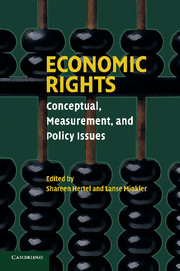Book contents
- Frontmatter
- Contents
- Contributors
- Acknowledgments
- 1 Economic Rights: The Terrain
- SECTION I CONCEPTS
- 2 The West and Economic Rights
- 3 Needs-Based Approach to Social and Economic Rights
- 4 Economic Rights in the Knowledge Economy: An Instrumental Justification
- 5 “None So Poor That He Is Compelled to Sell Himself”: Democracy, Subsistence, and Basic Income
- 6 Benchmarking the Right to Work
- SECTION II MEASUREMENT
- SECTION III POLICY ISSUES
- APPENDIX 1 Universal Declaration of Human Rights
- APPENDIX 2 International Covenant on Economic, Social, and Cultural Rights
- Index
- References
3 - Needs-Based Approach to Social and Economic Rights
Published online by Cambridge University Press: 18 December 2009
- Frontmatter
- Contents
- Contributors
- Acknowledgments
- 1 Economic Rights: The Terrain
- SECTION I CONCEPTS
- 2 The West and Economic Rights
- 3 Needs-Based Approach to Social and Economic Rights
- 4 Economic Rights in the Knowledge Economy: An Instrumental Justification
- 5 “None So Poor That He Is Compelled to Sell Himself”: Democracy, Subsistence, and Basic Income
- 6 Benchmarking the Right to Work
- SECTION II MEASUREMENT
- SECTION III POLICY ISSUES
- APPENDIX 1 Universal Declaration of Human Rights
- APPENDIX 2 International Covenant on Economic, Social, and Cultural Rights
- Index
- References
Summary
Social and economic rights are one of the most controversial issues in the theory and practice of rights. They are often referred to as the “rights of the second-generation” distinct from the “first-generation rights” that include civil liberties and political rights. However, the very category of social and economic rights is unclear and somewhat confused. Rights to own property and the freedom of enterprise are, in fact, basic freedoms rather than social rights: they empower an individual and limit the government's intrusion rather than suggest the government's benefits or regulation. Also a number of other social and economic rights resemble personal freedoms or political rights. It seems as if they were inserted into the category of “social and economic rights” primarily because there was no agreement on the immediate judicial enforcement of these rights.
However, even when we deal with social rights in a more narrow sense, we discover that they assume a very broad range of roles for the state. Free choice of employment and protection against unemployment (UDHR art. 23(1)) imply a protective role of the state. Many social rights call for a regulatory role of the state. Very few social rights demand direct provision of goods and services by the state. Finally, some social and economic rights deal with values and directives that can at best be the goal for social policy but they are to be implemented by nonstate actors or through international measures. There is much less confusion with the other categories of rights.
- Type
- Chapter
- Information
- Economic RightsConceptual, Measurement, and Policy Issues, pp. 56 - 75Publisher: Cambridge University PressPrint publication year: 2007
References
- 10
- Cited by



